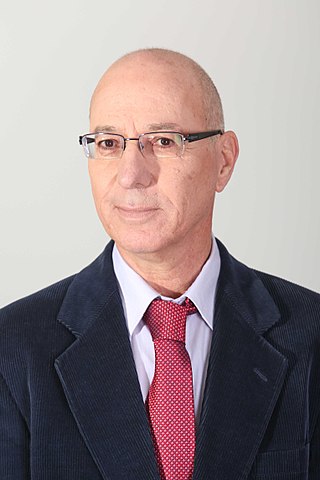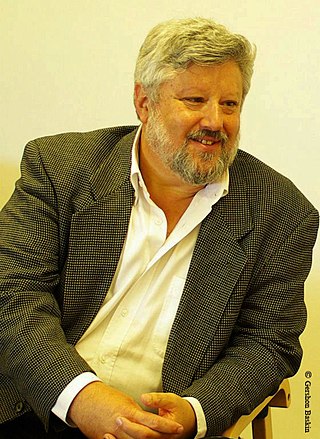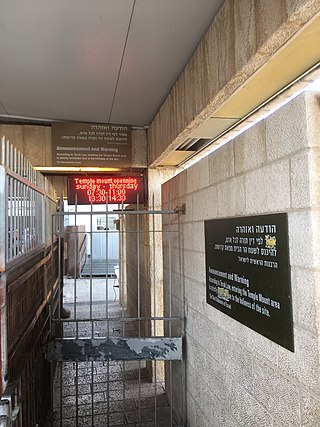
Moshe Amirav is an expert on the conflict in Jerusalem. [1] He is a frequent lecturer at international conferences and forums on Jerusalem and has authored six books and many articles on this subject. [2]

Moshe Amirav is an expert on the conflict in Jerusalem. [1] He is a frequent lecturer at international conferences and forums on Jerusalem and has authored six books and many articles on this subject. [2]
Amirav is a professor of Political Science at the Hebrew University of Jerusalem and an expert on the Jerusalem political conflict. [3] During the Six-Day War he served as a paratrooper and was wounded in the battle for Jerusalem on the day Israel captured the Old City, June 7, 1967. In the years 1981–1993, he worked closely with then Mayor of Jerusalem, Teddy Kollek, in charge of planning and development. In 2001 as advisor to Prime Minister Ehud Barak during the Camp David negotiations, Amirav headed a committee of experts who prepared blueprints for a political settlement in Jerusalem. The model is an open city when the Arab part will be the capital of Palestine and the Jewish part capital of Israel, Temple Mount with no sovereignty.
Amirav was involved in the political arena for many years. In 1987 he was the first to initiate negotiations with the P.L.O. Faisal Husseini, then leader of the Palestinians in Jerusalem with whom he prepared a plan for a confederative political settlement between Jordan, Palestine and Israel. [4] That year, the president of Romania, Nicolae Ceaușescu, invited Yitzhak Shamir and Yasser Arafat, to Romania for the first peace conference between the Israelis and Palestinians, on the bases of "The Amirav Husseini Plan". Prime Minister Shamir refused and Husseini was imprisoned. Amirav left the Likud party. His leave certainly had great impact at the time in Israel and abroad. In 1988 he established the "Semitic Confederation Movement" which included Israelis, Jordanians and Palestinians, academics, retired ex-Israeli generals and other public figures. He then initiated the first public peace conference between Israeli and P.L.O. personalities. This took place under the auspices of the Belgium government in Brussels. In 1989 he organized at Stanford University the meeting of top position Israelis and P.L.O. They signed the first peace agreement. Amirav is considered in Israel as the first barrier breaker with the Palestinians.[ citation needed ]
Amirav's book, "Jerusalem Syndrome: The Palestinian-Israeli Battle for the Holy City" was published by Sussex Academic Press in June 2009. [2]
The book analyzes how Israel has failed in its attempts to unify the city, and presents the argument that Israel should relinquish its claim on Palestinian neighborhoods and villages incorporated in 1967. Amirav suggests a unique and creative idea for a solution in Jerusalem: The Old City will be considered as a special zone neither Palestinian nor an Israeli sovereignty and will be run by a special regime. [5]
In 2007, his son, Nathanel Goldman Amirav, released a documentary about his father's employee, an undocumented Palestinian worker who "sneaks across the border from East Jerusalem to come to work every day." Goldman Amirav called the documentary My Father's Palestinian Slave. [6]

The Israeli–Palestinian conflict is one of the world's most enduring conflicts, beginning in the mid-20th century. Various attempts have been made to resolve the conflict as part of the Israeli–Palestinian peace process, alongside other efforts to resolve the broader Arab–Israeli conflict. Public declarations of claims to a Jewish homeland in Palestine, including the First Zionist Congress of 1897 and the Balfour Declaration of 1917, created early tensions in the region. Following World War I, the Mandate for Palestine included a binding obligation for the "establishment in Palestine of a national home for the Jewish people". Tensions grew into open sectarian conflict between Jews and Arabs. The 1947 United Nations Partition Plan for Palestine was never implemented and provoked the 1947–1949 Palestine War. The current Israeli-Palestinian status quo began following Israeli military occupation of the Palestinian territories in the 1967 Six-Day War.

Benjamin "Bibi" Netanyahu is an Israeli politician who has been serving as the prime minister of Israel since December 2022, having previously held the office from 1996 to 1999 and again from 2009 to 2021. He is the chairman of the Likud party. Netanyahu is the longest-tenured prime minister in the country's history, having served for a total of over 15 years. He is also the first prime minister to be born in Israel after its Declaration of Independence.

Sari Nusseibeh is a Palestinian professor of philosophy and former president of the Al-Quds University in Jerusalem. Until December 2002, he was the representative of the Palestinian National Authority in that city. In 2008, in an open online poll, Nusseibeh was voted the 24th most influential intellectual in the world on the list of Top 100 Public Intellectuals by Prospect Magazine (UK) and Foreign Policy.

Yitzhak Shamir was an Israeli politician and the seventh Prime Minister of Israel, serving two terms, 1983–1984 and 1986–1992. Before the establishment of the State of Israel, Shamir was a leader of the Zionist militant group Lehi. After the establishment of the Israeli state he served in the Mossad between 1955 and 1965 and as a Knesset member. He served as the sixth Speaker of the Knesset, and as foreign affairs minister. Shamir was the country's third-longest-serving prime minister, after Benjamin Netanyahu and David Ben-Gurion.

The 2000 Camp David Summit was a summit meeting at Camp David between United States president Bill Clinton, Israeli prime minister Ehud Barak and Palestinian Authority chairman Yasser Arafat. The summit took place between 11 and 25 July 2000 and was an effort to end the Israeli–Palestinian conflict. The summit ended without an agreement.

Likud, officially known as Likud – National Liberal Movement, is a major centre-right to right-wing political party in Israel. It was founded in 1973 by Menachem Begin and Ariel Sharon in an alliance with several right-wing parties. Likud's landslide victory in the 1977 elections was a major turning point in the country's political history, marking the first time the left had lost power. In addition, it was the first time in Israel that a right-wing party won the plurality of the votes. After ruling the country for most of the 1980s, the party lost the Knesset election in 1992. Likud's candidate Benjamin Netanyahu won the vote for Prime Minister in 1996 and was given the task of forming a government after the 1996 elections. Netanyahu's government fell apart after a vote of no confidence, which led to elections being called in 1999 and Likud losing power to the One Israel coalition led by Ehud Barak.

Tehiya, originally known as Banai, then Tehiya-Bnai, was an ultranationalist political party in Israel. The party existed from 1979 until 1992. In the eyes of many, Tehiya was identified with Yuval Ne’eman, who founded the party and headed it throughout its existence.
The London Agreement between King Hussein of Jordan and Israeli Foreign Affairs Minister Shimon Peres was signed during a secret meeting held at the residence of Lord Mishcon in London on April 11, 1987. Also present in the meeting were Jordanian Prime Minister Zaid al-Rifai and Director General of the Israeli Foreign Affairs Ministry, Yossi Beilin.
The Palestine–Israel Journal is an independent, non-profit, Jerusalem-based quarterly that aims to shed light on and analyze freely and critically, the complex issues dividing Israelis and Palestinians. In 2006 it was a candidate for the UNESCO-Madanjeet Singh Prize for the Promotion of Tolerance and Non-Violence and was recognized with a mention of honor for "its outstanding contribution to this great cause". In 2012, co-editors Hillel Schenker and Ziad Abuzayyad were awarded the Outstanding Contribution to Peace Award at the eighth International Media Awards held on May 5.

Zalman Shoval is an Israeli banker, politician and diplomat. He is also active in Israel's economic life. He was the Israeli ambassador to the United States in the years 1990–1993 and 1998–2000, and an active member of the Knesset in the Rafi-State List, and the Likud party.

Nathan Yellin-Mor was a Revisionist Zionist activist, Lehi leader and Israeli politician. In later years, he became a leader of the Israeli peace camp, a pacifist who supported negotiations with the Palestine Liberation Organization and concessions in the Israeli-Arab conflict.
Revisionist Maximalism was a short-lived movement right-wing militant political ideology and Jewish militant ideology which was part of the Brit HaBirionim faction of the Zionist Revisionist Movement (ZRM) created by Abba Ahimeir.

Yitzhak Reiter is an Israeli political scientist who is full professor of Islamic, Middle East and Israel Studies serving as the Head of Research Authority and Chair of Israel Studies at Ashkelon Academic College. He is also a senior researcher at both the Jerusalem Institute for Policy Research and the Harry S. Truman Institute for Peace Research of the Hebrew University of Jerusalem as well as Editor-In-Chief of Israel Academic Press.

Ziad Ali Khalil AbuZayyad is a Palestinian lawyer, journalist and politician.

The Madrid Conference of 1991 was a peace conference, held from 30 October to 1 November 1991 in Madrid, hosted by Spain and co-sponsored by the United States and the Soviet Union. It was an attempt by the international community to revive the Israeli–Palestinian peace process through negotiations, involving Israel and the Palestinians as well as Arab countries, including Jordan, Lebanon and Syria.

Gershon Baskin since August 2021 is the Director of the Holy Land Bond a new investment fund aimed at investing in housing projects for Palestinians in East Jerusalem, integrated housing projects for Jewish and Palestinian citizens of Israel in Israel's "mixed cities" and employment and industrial zones that are either cross boundary Israeli Palestinian, or for Jewish and Palestinian citizens of Israel. Baskin is also the Director of the newly formed International Communities Organization - Middle East Branch, which is connected to the UK based International Communities Organization - ICO.

Temple Mount entry restrictions are restrictions on entering the Temple Mount or Haram al-Sharif in Jerusalem, which is a holy place for Muslims, Jews, and Christians. At present, the Government of Israel controls access to the site, an Islamic religious endowment that lies under the management of the Jordan-based Jerusalem Islamic Waqf. There are entry limits to the Temple Mount for political and security reasons. In addition, Jewish religious law imposes restrictions on religious Jews on entering the compound.

Moshe Sharon is an Israeli historian of Islam.

Annexation of the Jordan Valley is the proposed application of Israeli sovereignty over the Jordan Valley. The idea has been advocated by some Israeli politicians since the Israeli occupation of the West Bank began in 1967, most notably with the Allon Plan and the 2020 Trump peace plan. Israeli prime minister Netanyahu's September 2019 annexation proposal included Jericho becoming a Palestinian enclave.